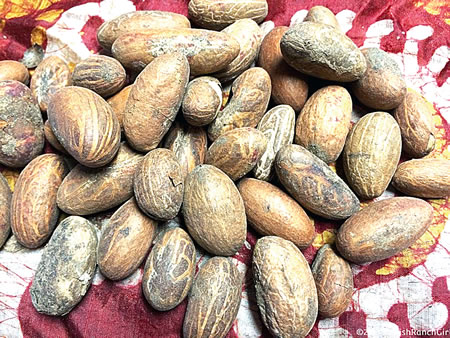When it comes to exploring the possible interactions between natural remedies and conventional medications, bitter kola has attracted significant attention. Concerns have been raised about the potential impact of bitter kola on the effectiveness and safety of many drugs, including antibiotics, painkillers, and even malarial medicines.
Generally, bitter cola and kola nuts are socialising agents and ingredients in the country and are shared in many traditional social events.
Bitter kola also has a long history of use in African folk medicine, where it is traditionally used to treat ailments such as respiratory conditions, digestive issues, voice hoarseness, aphrodisiac, liver diseases, and infections. It is also used locally as an antidote to poison and in cases of drug overdose.
While these traditional uses have their merits, when bitter kola is consumed alongside certain medications, interactions may occur, potentially altering their effectiveness or causing adverse effects.
But experts who explored bitter kola use and its impact on two commonly used drugs in Nigeria (sulphamethazine and paracetamol) found that it may reduce bioavailability by interfering with drug absorption across the gastrointestinal mucosa, suggesting a lesser effectiveness.
The study, in Planta Medicine, was on albino rabbits. Two groups of rabbits were treated with a concentration of the seed suspension given concurrently with sulphamethazine (an antibiotic) and paracetamol, respectively. The control groups were given equivalent doses of either drug alone.
Blood was withdrawn from the left ear at one-hour intervals for five hours and tested to determine the presence of these drugs.
The researchers reported that bitter kola levels in the blood significantly decreased the bioavailability of the two drugs by about a quarter. Also, the time of peak and peak concentrations were also reduced, while the concentration at one hour was only significantly different for paracetamol.
In another study, researchers said individuals with malaria should avoid taking bitter kola concomitantly with quinine. They reported a potential interaction between bitter kola ingestion and quinine disposition in healthy volunteers.
Quinine is a drug used to treat malaria, and the continued relevance of quinine in malaria therapy in sub-Saharan Africa raises the possibility of its concomitant use with other natural remedies in the community.
This is particularly important because bitter kola seed is often ingested as a dietary supplement. Some proprietary dietary supplements of bitter kola seed or its extract, alone or in combination with other medicinal plants, are now used in the management of several clinical conditions.
This was a randomised crossover study in the Journal of Clinical Pharmacology that had 24 healthy Nigerian men and women assigned into two groups on the basis of bitter kola doses orally ingested at Obafemi Awolowo University.
These volunteers were non-smokers and were not on any other medication or continuous medication for at least two weeks prior to the commencement of the study.
Of course, individuals who are pregnant, breastfeeding, or have a history of hypersensitivity to quinine or similar agents or adverse side effects from taking bitter kola seeds were not allowed in the study.
Each person received 600 mg of quinine sulphate before and after ingesting 12.5g of bitter kola once daily for seven days (Group A) or 12.5g twice daily for six days and once on the seventh day (Group B). Blood samples were collected, and their content of quinine was determined.
Precisely, the bitter kola-quinine interaction was only at the higher dose of bitter kola intake, thus suggesting a dose-dependent interaction occurring between bitter kola and quinine.
The researchers suggested that “a plausible explanation for this occurrence may be that the presence of a higher amount of bitter kola (known to be rich in fibre) in the gut may have altered the systemic bioavailability of quinine.”
For individuals managing diabetes, the interactions between bitter kola and antidiabetic drugs can be of concern. Bitter kola has blood sugar-lowering effects, which may enhance the blood sugar-lowering effects of antidiabetic medications.
This can potentially lead to excessively low blood sugar levels (hypoglycemia). So, individuals need regular monitoring of blood glucose levels and medication adjustments. This is essential to prevent complications.
The consumption of bitter kola and antihypertensive drugs is disastrous either way, as this can lead to excessively low blood pressure (hypotension) or increased blood pressure. Antihypertensive drugs are prescribed to manage high blood pressure.
Some studies have reported bitter kola to have blood pressure-lowering (hypotensive) effects, which may further lower blood pressure when combined with antihypertensive medications.
While other studies reported that the nut contains a stimulant whose properties can increase blood pressure, this can harm people already suffering from hypertension.
Anticoagulants, or blood thinners, are medications used to prevent blood clot formation. Bitter kola contains compounds that possess anticoagulant properties. So, consuming bitter kola alongside anticoagulant drugs such as warfarin may potentially increase the risk of internal bleeding.
Sedatives, including tranquillizers and sleep aids, are used to promote relaxation and manage anxiety. Bitter kola contains compounds that may have sedative effects; when combined with sedative medications, bitter kola may potentiate its sedative properties, leading to increased drowsiness and central nervous system depression.
Overall, the interactions between bitter kola and drugs are complex and can depend on many factors, including the specific drugs and doses used, the individual’s health status, and the mode of administration.
Therefore, it’s important to discuss with a healthcare professional before taking bitter kola or any other herbal remedies if you are currently taking prescription medications or have any pre-existing health conditions.
